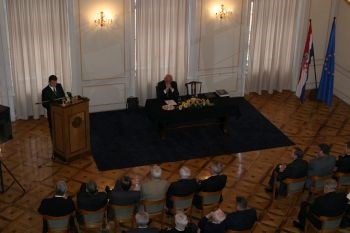- Published: 11.11.2008.
Minister Gordan Jandroković held lecture at HAZU entitled Croatia – Foreign-Policy Challenges
As four basic guidelines of Croatia’s foreign policy, Minister Jandroković pointed out the EU membership, NATO membership, Croatia’s leader role in South Eastern Europe, and the UN Security Council membership
He pointed out that Croatia expects to realize full-fledged NATO membership as early as start-April next year, at the NATO 60th anniversary commemoration ceremony. He added that the ratification of the Accession Protocol is going as planned and has thus far successfully been carried out in eight NATO members.
He also said that Croatia is ever closer to the full-fledged EU membership, that the recent European Commission’s Croatia Progress Report is the most positive one thus far, and that Croatia has also gotten a general schedule for completing the EU negotiations by end-2009. Minister Jandroković also pointed out Croatia, owing to its active political, economic, and security engagement, along with its success on the road to the EU and NATO, has been recognized as the leader in South Eastern Europe.
As another great success of Croatia’s foreign-policy engagement Minister Jandroković pointed out the membership in the UN Security Council, in which Croatia has been acting for a full year as a non-permanent member. Adding that the Security Council deals with solving the current crisis and other global security issues, Minister Jandroković pointed out that it is a proof that Croatia is a country co-deciding on important global-policy issues. He added that Croatia, through the Security Council, peacekeeping missions, and participation in multilateral organizations and initiatives, will continue to give its contribution to world peace and security.
As the current global-policy topics Minister Jandroković listed the danger of WMD proliferation and nuclear technology development, which necessitates the strengthening of the existing international mechanisms. He described the current economic and financial crisis as an indication of a new paradigm in global economy and finance. In that regard, he also noted energy security and supply, as well as the climate changes. He said that the majority of potential oil and gas lines should pass through South Eastern Europe, including Croatia, as its geographical position opens vast possibilities for developing cooperation with the European space and joining the global, especially south eastern, Mediterranean, and Eurasian energy circles. He added that one of the challenges will be – despite the strict regulations on the greenhouse gas emission restrictions and the resulting expenses to the industry – to prevent the transfer of production capacities into the countries with a lower level of ecological protection. He also touched upon the issue of interconnectedness between the current demographic trends and migration.
Minister Jandroković said that Croatia should lead a responsible foreign policy that would, after the integration into the Euro-Atlantic structures, successfully usher the country and society into the next phase – a phase in which Croatia will act as a partner and ally to the EU and NATO members in finding the solution to modern challenges. Minister also Jandroković described the EU and NATO membership as a logical continuation of Croatia’s political, economic, and social development so far, as well as a clear dedication to a better life for all of the Croatian citizens.
Minister Jandroković pointed out the utmost importance of the peace and stability of these areas, which is why the entire region should become a part of the Euro-Atlantic community as soon as possible, with two important factors: maintaining a membership perspective and strengthening the cooperation with South Eastern Europe on all levels. He, therefore, stressed Croatia’s readiness to share its experience though a bilateral cooperation with all of the countries in the regions, as well as with the international community.
In that regard, as recently announced by the EU Enlargement Commissioner Olli Rehn, Minister Jandroković expressed his conviction that 2009 – apart from being the year of completing Croatia’s EU negotiations and joining NATO – would also be the year in which the progress of Europe’s south east towards the EU will be sped up.



